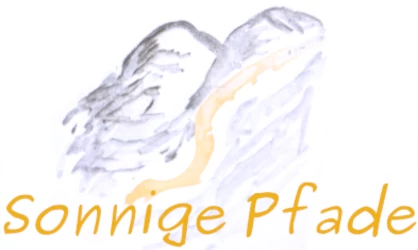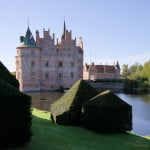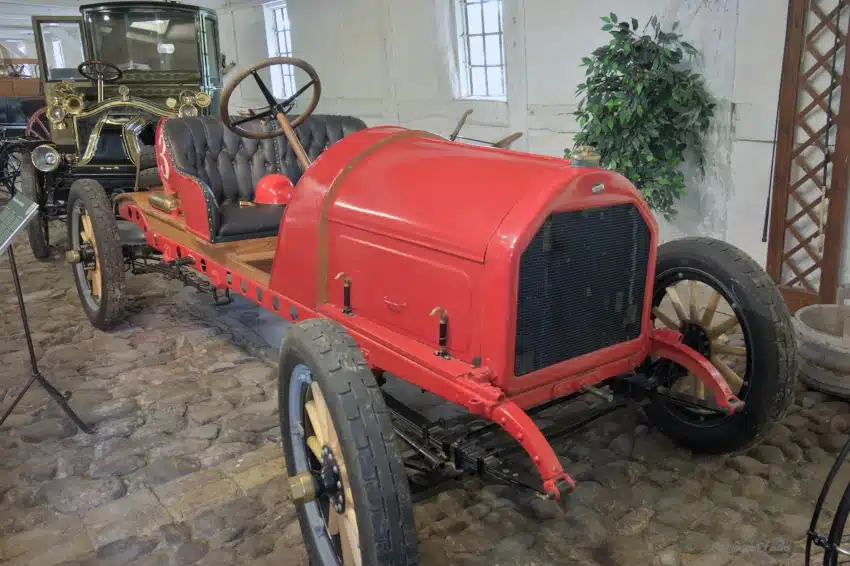
A visit to Egeskov Castle and Park should definitely be on the agenda for travelers to Funen. The Renaissance manor with the castle pond and the varied garden landscape alone make a visit to Egeskov worthwhile. But even if you are not at all interested in flowers and gardens, the Danish visitor center Egeskov is worth the trip. Families and groups of friends with very different interests can still have a great experience together thanks to the various exhibitions in the courtyards of Egeskov Castle. All the exhibition areas presented here can be visited with a single ticket for the castle park and courtyard buildings (without visiting the manor).
On the trail of 200 years of style and mobility
The secret treasures of the ladies of Egeskov Castle
In the gatehouse next to the castle, visitors can look into the closets and chests of the ladies of Egeskov Castle. On display here are dresses made of the finest fabrics with filigree decorations and all kinds of accessories from around 1850 to 1900. There are also individual fashion magazines with designs from Paris and the fashion designers of the time.
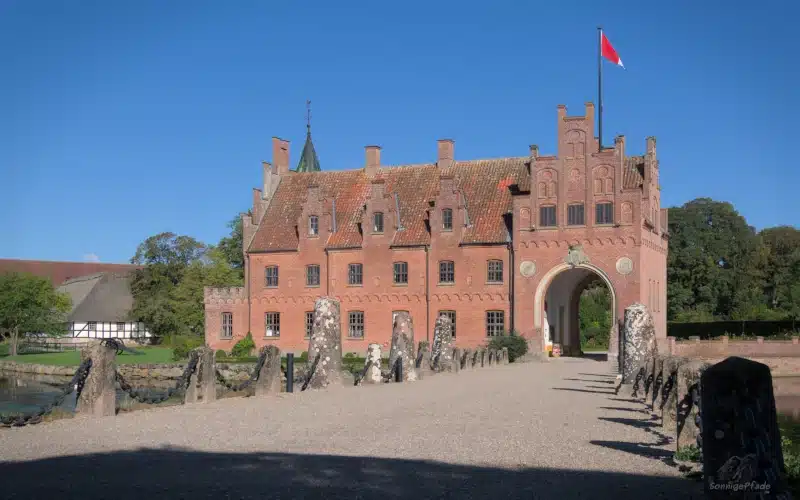
Part of the exhibition in the gatehouse is dedicated to the service clothing of domestic servants, maids, farmhands, coachmen and other servants. This gives visitors an impression of the taste and use of clothing in everyday life and for festivities on northern European estates 150 years ago.
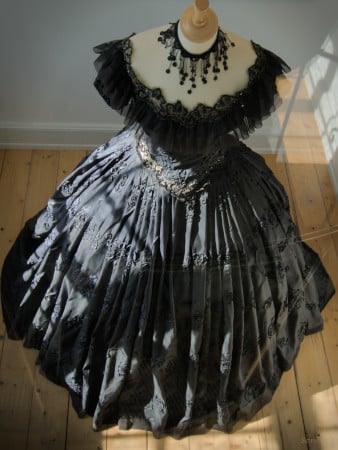
Art exhibition in the Michael Ahlefeldt Gallery
The Ahlefeldt Gallery is located in an old servants‘ house opposite the Jomfru Rigborg café in the White Garden. The artist Michael Ahlefeld exhibits his latest works and sketches here. During my visit, the light installations and line drawings provided the inspiration for his light works. To create the line drawings, the artist explores his subconscious and tries to let the positive energy of his surroundings flow into the drawings. The compositions convey joy, enthusiasm and dynamism and are intended to encourage the viewer to share in the energy of the works.
The Ahlefeldt Gallery is freely accessible to visitors to Egeskov Castle and Park.
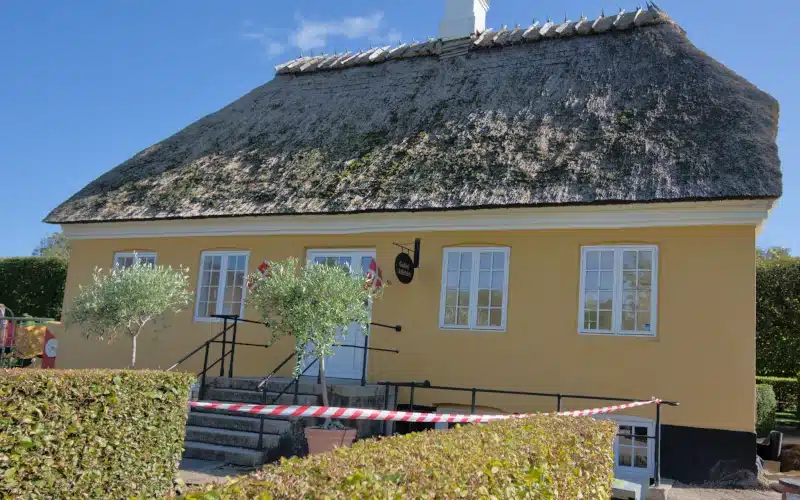
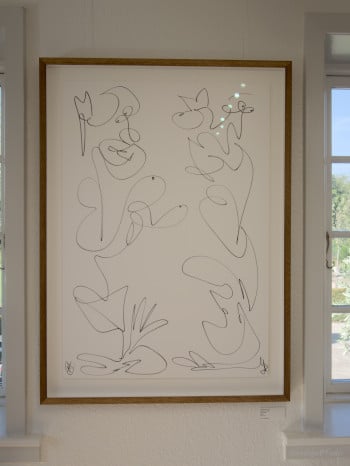
From the carriage to the car, from the bicycle to the motorbike
The exhibition in the old stables at Egeskov Manor could be titled something like this, but officially it is entitled “Man and Mechanics”. Here you can actually trace the transition from “muscle-powered” to motorized mobility. The first automobiles looked much more like horse-drawn carriages than today’s conventional metal cars – and so visitors sometimes have to look twice to see whether it is still a horse-drawn vehicle or already a petrol or diesel-powered mobile. Gradually, the separate engine compartment, the typical “snout” of the first combustion vehicles, developed. However, the passenger compartment, the “box”, initially remained angular, bulky and not very streamlined. This was not at all necessary at the low speeds of the early years of motoring.
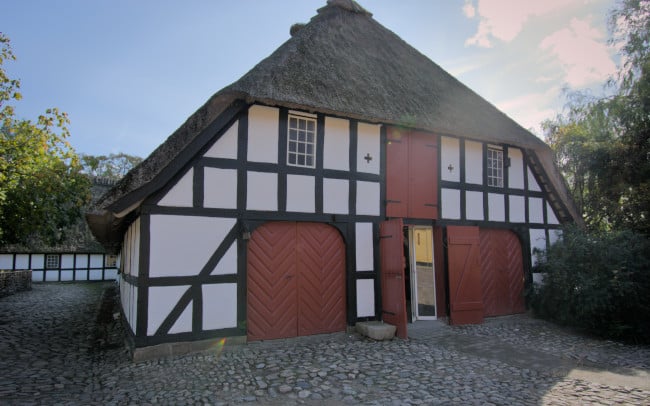
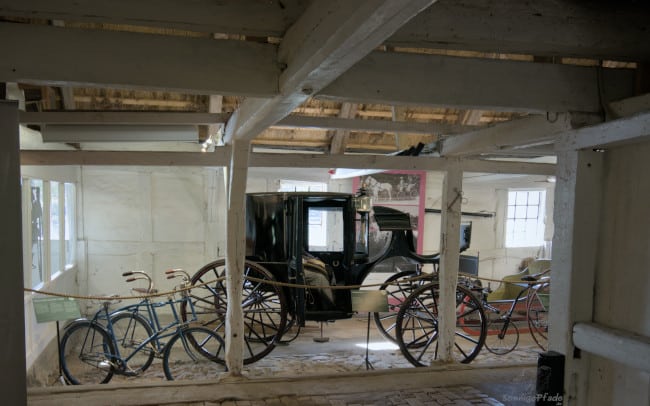
The transition to two-wheelers was similarly interesting from a technical point of view. The bicycle, itself still under development, made motorization possible through add-on constructions. Petrol engines hung in frames on the sides of the luggage rack or were mounted on top and drove the rear wheel, sometimes also the front wheel, by means of V-belts.
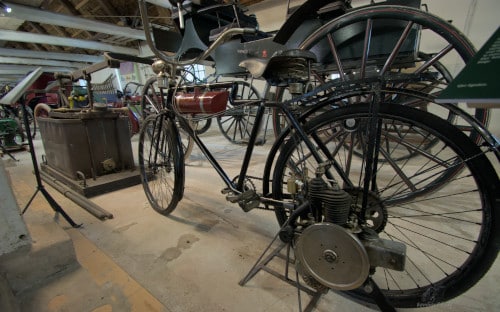
Vintage cars and airplanes in the large hall at Egeskov Castle
The next attractions of Egeskov exhibitions await in a large hall directly opposite the stables. An extensive collection of vintage cars from around the 1930s to the early 1990s makes the paintwork and chrome sparkle and the hearts of technology fans beat faster. Various models of sports cars, convertibles and dignified limousines and even buses are on display. Above them hover airplanes from the early days of aviation and more recent ones. There is also a fire department and a few motorcycles in the hall – as a kind of preview of the other exhibitions.
You can satisfy your hunger at the museum kiosk in the transition to the next exhibition (also with outdoor seating).
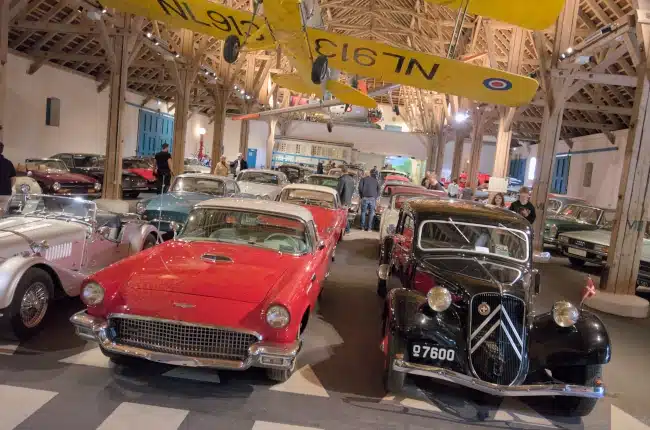
An extensive motorcycle exhibition
The lords of Egeskov Castle are obviously motorcycle fans. Because the next hall is full of them. Models from all over the world and from all decades of motorcycle construction stand and hang in this room. Yes – hanging: Probably to avoid complaints about the “crooked backs” of highly interested exhibition visitors, a large number of the motorcycles are suspended from steel cables practically at eye level. This makes it easy to get to grips with the technical details and design features and view the motorcycles from an “elevated position”.
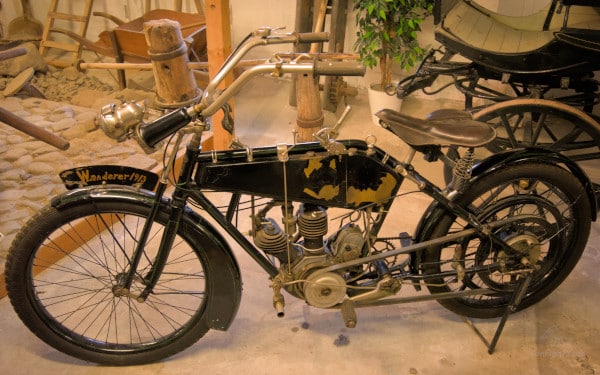
The motorcycle exhibition at Egeskov includes road bikes suitable for everyday use such as racing and cross motorcycles, enduro bikes as well as special models such as police motorcycles. The former “Eastern Bloc” is also represented with individual machines. Motorcycle freaks can certainly spend a few hours enjoying the steel and rubber in this exhibition room alone.
Falck Museum: Fire brigade and rescue services
You will see red in the next exhibition room. Here you will find fire departments and rescue vehicles from several decades, as well as the protective clothing and equipment worn by firefighters and paramedics. In Denmark, the rescue service is called Falck. The modernization progress in technology in this area is interesting.
Outdoor, camping, caravanning
The last, but very large new buildt hall at the far end of the exhibition complex at Egeskov Castle is dedicated to camping and caravanning. Denmark also has a long tradition of producing its own caravans and camping trailers. Motorhomes from five decades are gathered together and illustrate the developments in the caravanning segment. The e-car development also presents trailer manufacturers with new challenges. In order to make sensible use of limited energy resources and the performance of electric cars, caravan manufacturers are developing new, lighter models with less air resistance. Some of these are “pop-up” caravans, which have flexible side wall sections and can be unfolded at the campsite. The caravan exhibition is almost like a trade fair – individual camping trailers are virtually brand new and the latest trends in the industry!
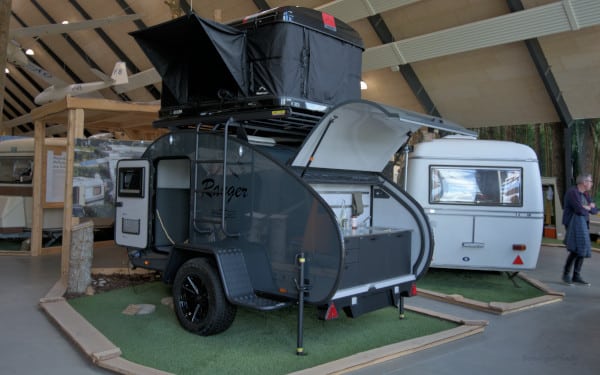
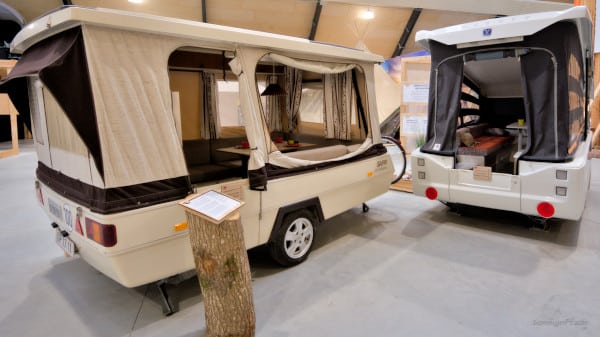
But outdoor activities are also promoted with new ideas, such as simple shelters for overnight stays, which are even available as rustic “double-decker” shelters. Recreated bivouac sites show how people with the simplest equipment have ventured into ever more extreme areas of nature and tested the limits of what is humanly possible.
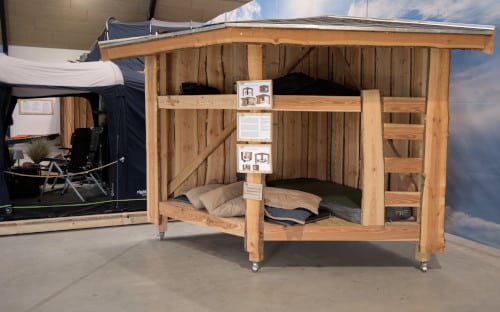
Conclusion on the exhibitions at Egeskov Castle
The castle and gardens of Egeskov are not the most popular attraction on the Danish island of Funen for nothing, with around 250,000 visitors a year. The traditional grounds alone, with the moated castle, the park and the varied gardens, are worth the trip. But architecture, art and garden culture are not necessarily everyone’s cup of tea. It can be a real strain on family peace when some people can enjoy the flowers, fountains and garden ornaments for hours on end, while the rest of the family (or friends) don’t have much interest in them. The owners of Egeskov Castle have obviously recognized this problem. The diversity of interests and the passion for collecting of the Ahlefeldt – Laurvig – Bille family as owners has certainly made it much easier to find a solution.
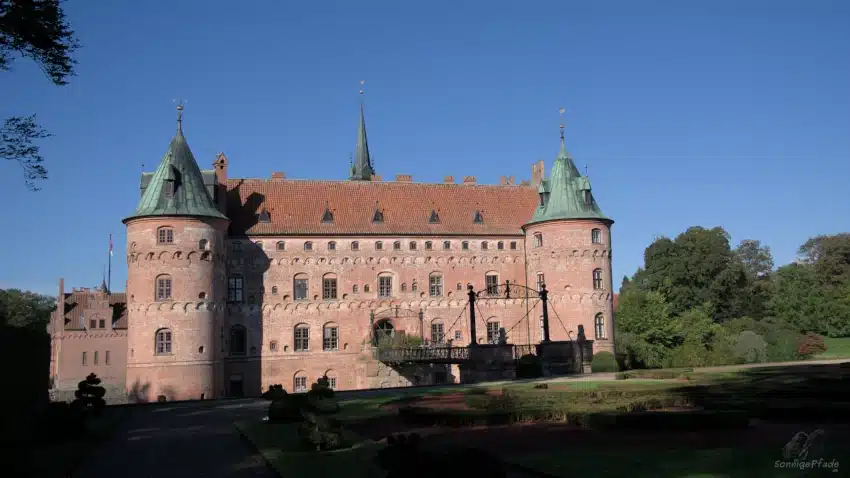
Those who are not interested in garden culture or Renaissance architecture will find enough alternative topics in the extensive exhibitions to fill the day at Egeskov with their own experiences. Garden lovers can take their time to enjoy the extensive grounds, while technology freaks will find plenty of (formerly hot) iron, gleaming chrome and shiny paintwork and can dream the eternal dream of boundless freedom in the mobility society. The “complete package of castle, park and exhibitions in Egeskov” is already too extensive for one day. At any rate, although I am persistent and very patient when visiting museums, at some point I was completely saturated.
Contains *advertising!
Travel tips for visiting the exhibitions at Egeskov Castle
You can find the most important tips in the main article on Egeskov Castle!
Children in the park at Egeskov
Children can enjoy Egeskov if they spend a lot of time in the extensive play facilities. There is a climbing garden, several labyrinths, a large playground with an adventure ship, a cable car, tree top walking etc. Of course, the exhibitions, gardens and the rest of the grounds are also interesting for children, especially as the interlocking gardens with their hedges look even more adventurous from a child’s perspective. However, sooner or later, most children will become over-saturated. Then it is better to find a quiet spot or a simple piece of play equipment to “let off steam” and let the many impressions settle for the time being.
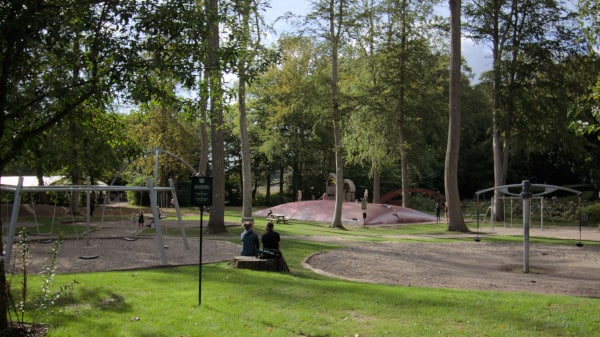
Food and catering
There are several options for eating on site in Egeskov Park. The Jomfru Rigborg café by the White Garden is a fine place to eat. There are also well-maintained toilets there.
Otherwise, there are two simple kiosk snack bars scattered around the grounds: the Labyrinth Kiosk at the edge of the playground and the Museum Kiosk between the large vintage car exhibition hall and the motorcycle exhibition. Coffee to go is also available in the castle boutique at the gatehouse and in the nursery at the entrance.
If you prefer, you can bring your own picnic basket and there are plenty of benches for a snack from your bag.
After visiting Egeskov Castle outside the grounds, there are several small restaurants and pizzerias in nearby Kvaerndrup.
Weather at Egeskov Castle
When visiting the Egeskov exhibitions, you are not so dependent on the nice dry and sunny weather. The exhibitions are almost all in covered and closed rooms. But perhaps this is a good way to survive a bad weather day on the island of Funen and to bridge the gap with exciting impressions from the history of technology? In any case, the weather at Egeskov Castle for today and the next few days is shown opposite….
